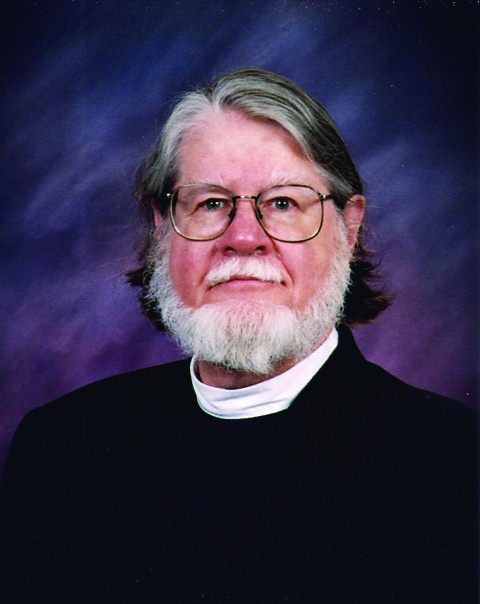Robert Jenson and the God of the gospel
With the critical knife of a theology of the cross, Jens sought to cut through modern fogs of religiosity.

My life and work as a theologian was intertwined with Robert W. Jenson—“Jens,” as friends and colleagues addressed him. I discovered him in his book The Triune Identity when I was finishing my dissertation at Union Theological Seminary in 1983. Ideas that I had struggled to articulate suddenly became lucid in his striking and powerful formulations. The patristic doctrine of the tripersonal God whose being is in communion was not a misleading, intellectualizing speculation, Jens argued, but the surprising ontological description of “the God of the gospel.”
Why does this matter? We do not presume first to know who or what God is or must be, Karl Barth taught Jens. Rather, we discover what God is and hence can be from the disruptive evangelical narrative that tells who God is: the Father who generates His own Son, on whom He breathes His own Spirit, so that, gathered by the Spirit into union with the Son, we live to the glory of the self-surpassing Father of all grace and goodness. This description serves to identify God in the maelstrom of experience. This is the crying need of the community of faith if it is to remain faithful to its mission in a world surfeit with religious egoism and triumphalist ecclesiologies and with utopian political messianisms, which bathed the 20th century in rivers of blood.
Read our latest issue or browse back issues.
Against those theologies of glory, Jens wrote, God’s self-identification with the Crucified frees us from the need to find God in the projection of our own ideals, perfections, or aspirations. With the critical knife of a theology of the cross, Jenson sought to cut through modern fogs of religiosity, even ones that take apparently secular form. Indeed, in his penetrating early study God after God, he saw such secular religiosity at work in liberal Protestant theology, especially in the United States, which was often barely conscious of the ways it was a projection of human ideals. Like Dietrich Bonhoeffer, another inspiration alongside Barth, Jens considered contemporary American religiosity, whether fundamentalist or modernist, as “Protestantism without Reformation.”
But he also came to be suspicious of any narrow neo-Reformation theology; his last published essay in this 500th anniversary year bears the laconic title, “What’s to Celebrate?” I don’t know if Jens knew Brad Gregory’s book The Unintended Reformation, but I can confidently speculate that he would have agreed with him that sola scriptura cannot bear the weight Protestantism has placed on it. For Jens, subsequent history has shown that sola scriptura self-destructs into an endless series of sectarian permutations, each one claiming the right reading of the Bible or, later, the right history by which the Bible could be criticized and corrected.
American theology at its root shared in this Protestant primitivism, whether in the form of conservative biblicism or liberal historicism. Like others in his circle—such as Jaroslav Pelikan and Robert Wilken—Jens saw the history of dogma as a history of biblical hermeneutics. This meant for him that “orthodoxy” in dogma is never an accomplished fact, but is undertaken as an unfinished work in the Spirit. Indeed, just that unfinished business of searching the scriptures to identify the God of the gospel here and now specifies the task and function of theology as a church discipline of critical dogmatics.
Thus Jens’s style as a theologian was very much like that of Barth. Although accused by critics on the left of being “neo-orthodox” and of the right of being “heterodox,” Jens saw dogmatics as the critical and communal reflection of the church on the most fundamental concept in theology, namely, God. Since theology is thinking about the living God of the gospel, whom we can identify but not capture, theology must ever start afresh, until the promised consummation. This style, above all, is what I learned from Jens.
Of course, there were other inspirations at work in his magnificent oeuvre. One has to mention the Cappadocian fathers, Martin Luther, Rudolph Bultmann, and a host of ecumenical conversation partners, especially Roman Catholics. Jens was a Lutheran theologian but not of the wagon-circling type. He was, like all good theologians, endlessly embarrassed by his denominational affiliation. He was a theologian of the church and for the church in an epoch that he regarded as particularly debased. He once penned a much-discussed essay titled ”How the World Lost it Story.” His diagnosis was that Western civilization had come to prefer the unknowable One to the revealed Father of the Son in the Spirit—and had thereby lost its way.
As a young theologian, my first substantial encounter with Jens was a debate conducted in the early 1980s on the morality of nuclear deterrence. Jens, following the later Barth, held that the reconciliation of the world was already God’s accomplished deed in Christ. From this position he concluded that American Christians, acknowledging the sinfulness of threatening mass murder, should advocate unilateral nuclear disarmament, just as Barth had protested the remilitarization of West Germany in the 1950s and the deployment of nuclear weapons there.
Under the influence of Augustine, Luther, and especially Reinhold Niebuhr, I found Jens “weak on sin” in the sense that he did not sufficiently reckon with the persistence and power of sin in the life of the redeemed, as per Niebuhr’s Moral Man and Immoral Society. In turn, he found me too old-fashioned a Lutheran when I argued that “mutually assured destruction” was, in Niebuhr’s ironic way, “God punishing one jackass with another,” as Luther might have put it, in order to constrain them both. Perhaps this divergence on the present state of reconciliation signals an abiding difference between us.
But our differences about this did not stand in the way of his befriending me. He encouraged me to apply for a junior position at the seminary where he was teaching. That didn’t work out. He eventually became weary of declining intellectual standards and increasing political correctness at seminaries and colleges, and with his friend Carl Braaten he took early retirement in order to found the Center for Catholic and Evangelical Theology and its journal, Pro Ecclesia (full disclosure: I am on the board of the center).
What is a church theologian to do when his denomination no longer values theology? This was the question to which Jens addressed himself in his remaining years directing the Center of Theological Inquiry in Princeton. The 1990s saw the publication of his demanding but increasingly influential Systematic Theology. He told me during this time that theologians have to take the long view. The period of cultural, intellectual, institutional, and spiritual decline through which American Christianity is passing today is a judgment of God on us “wicked Christians” (Luther) which we can hardly yet comprehend. In this context, rigorous theology, especially theology pro ecclesia, attests the divinely intended sign of the world’s coming redemption.
Jens loved to cite the joke of the 19th-century liberal theologian Alfred Loisy: “Jesus promised us the Kingdom. What we got was the Church.” But Jens lived his theological life in hope of the coming catholic and evangelical convergence, overcoming the schisms of 1052 and 1530. He was a genuine “theologian of hope” in that “hope that is seen is not hope.”
In this vulnerable work of hope during this final stage of his theological career, Jens suffered some slings and arrows from other theologians. Denominational Lutherans regarded him as a traitor to true-blue Lutheranism. The Orthodox theologian David Bentley Hart, in an outburst of polemical overkill, charged that Jens’s cross-scarred God, who is “capable of suffering,” was the metaphysical basis for Auschwitz. If God becomes God in overcoming evil, Hart charged, then evil belongs to God’s identity and His triumph over it is reactionary, not the simple expression of a timeless and universal goodness. The Catholic theologian Joseph White, in similar incomprehension, dismissed Jens’s doctrine of God as a warmed-over version of Hegel that emptied the transcendent God of majestic simplicity into a pantheistic fog of temporal processes.
There are, of course, features of Jenson’s theology that elicit such critique. I too worry about the inordinate influence of German idealism, which moves theology away from the pragmatic work of identifying the God of the gospel in history to the philosophical-theoretical ambition of comprehending God—a slippery slope into sophisticated atheism if, with Hegel, God is to be comprehended as His history with creation. If indeed God is thought somehow to achieve being through the world’s becoming, then God’s freedom is circumscribed by the contingencies of history—a problem, it seems to me, that Jens never resolved.
In his Systematic Theology, all Jens could muster finally against that apparent implication was the weak affirmation, “it could have been otherwise”—we know not how. In my own work I have tried to show that Jens’s strong Trinitarian personalism offers a better way to warrant the freedom of the God of love. Indeed, in the same Systematic Theology Jens argued that theology does not need to borrow a social theory from the philosophers because the Trinitarian communion of God’s being is Christianity’s social theory of the coming Beloved Community. With this great idea of the divine freedom to love in mind, may Jens’s legacy be marked, learned, and inwardly digested.
A version of this article appears in the print edition with the title "Seeing the God of the gospel."






